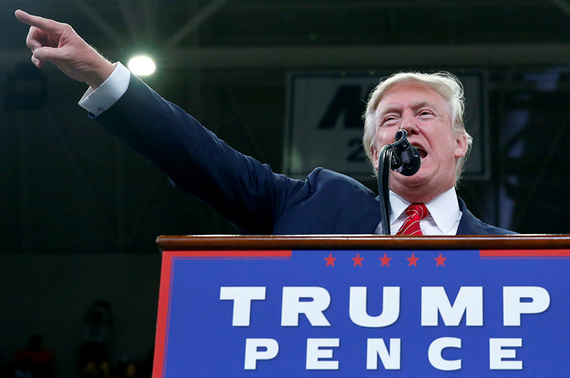Some 50 Republican "foreign policy experts," self-proclaimed insiders whose insights led the United States into a disastrous and still burning war in Iraq, have recently published a "we believe" letter in the New York Times reviling Donald Trump and deriding him as unsuited to take up the reins of U.S. foreign policy. But who are these experts and what gives them standing to speak so imperiously about the direction of future U.S foreign policy?
With a few exceptions such as former Governor Tom Ridge of Pennsylvania and my esteemed friend Ambassador John Negroponte, the 50 are largely national security and foreign policy functionaries of the G. W. Bush Administration era now entrenched in academia or elsewhere. They have one thing in common: They are previous practitioners of and current apologists for now discredited foreign policy initiatives the Bush Administration advanced in the Middle East. Obama adopted those Bush initiatives in large measure. But Donald Trump has forcefully questioned and repudiated many of them. Notably, many big names --Henry Kissinger, James Baker, Condoleeza Rice - of the Republican foreign policy establishment are not signers of The Times letter.
In the military these initiatives were collected together under the catchy phrase "Shock and Awe"; in foreign policy, the model program was styled "Operation Iraqi Freedom" -- relabeled by Obama in 2010 as "Operation New Dawn." But in both the military and foreign policy realms these were misguided efforts based on a false assumption. Together they did unprecedented damage to U.S. interests, contributing in large measure many have concluded to the emergence of ISIS in Iraq and Syria and setting the stage for today's virulent brand of worldwide radical Islamic terrorism.
The policies were based on a logical blunder by policymakers late in the 20th century. The theorists concluded that the break-up of the Soviet Union was affording the United States, as the only still existing super-power, a unique opportunity to reshape the world. We could easily impose, for instance, our national will, by overwhelming conventional force if necessary, to transform Middle Eastern despotic states into American-style democracies. But they were wrong. As we came to learn, quick victories over standing armies ("Shock and Awe" or "rapid military dominance") is not necessarily a road leading to democracy but, rather, can lead to chaos, including unintended consequences such as Muslim civil war, prolonged street fighting, and terrorist warfare. So the vision of creating Middle Eastern democratic states in our image proved unrealistic, a pipe dream overwhelmed by traditional tribal divisions and bloody Shiite, Sunni and other sectarian passions.
The 50 experts are making an argument to authority. Even if an argument to authority weren't a classic fallacy, why should any of us (left, right, center) grant this group--whose members steered a policy course that has proved dreadfully costly in lives lost and treasure squandered--any authority to comment or advise us.
Although I find Donald Trump's blunt call for reassessment of our priorities long overdue, I can appreciate that there are those who find him off-putting--even when he's saying things they know are true. The signatories to this hit piece tied themselves in knots explaining that they didn't propose to talk about policy positions--only fitness and temperament. They protest too much. And they are playing to those who are unsettled by Donald Trump's outspokenness and departures from the script (and the orthodoxies) the pundits tell us he is supposed to follow.
By taking their stand, ostensibly on the narrow high ground of temperament, the signatories plant their flag for a candidate whose hot temper (albeit one well-masked in public) and vindictiveness are well-documented. They plant their flag, too, for a candidate who has been disturbingly careless with classified information. And they condone a candidate who is part of a global scale pay-to-play scheme. Entities and individuals whose interests diverge from our nation's have paid handsomely for access to the Clintons. Surely that should raise some questions about fitness.
Having led their party and the nation into disastrous foreign policy adventures, the wise experts who presume to teach us about Donald Trump's mental states, laid the groundwork for their party's defeats in 2008 and 2012. Now, on grounds of "temperament" they are working to ensure its defeat again.
Donald Trump won the Republican nomination by arguing (repeatedly) for avoiding overly ambitious military and foreign policy adventures and using American interest as a guiding principle. Notwithstanding his campaign style and (unacknowledged) playful sarcasm in public discourse, his repeatedly stated foreign policy positions represent well-tested ideas and principles. He won an argument in the Republican party and the Brahmins lost. But they deserved to lose. And they don't deserve to be granted any authority in debates and disputes about what will be prudent for our nation going forward.
The claims about temperament and suitability (which reflect, among other things, a shameless application of double standards) are cover for policy differences and self-interest. And they are not serious.
Ambassador Faith Whittlesey served as White House Director of the Office of Public Liaison from 1983 to 1985 and twice, from 1981 to 1983 and again from 1985 to 1988, as U.S. Ambassador to Switzerland. She also was active in President Reagan's unsuccessful 1976 campaign and was Co-chairman of President Reagan's Pennsylvania campaign in 1980.
